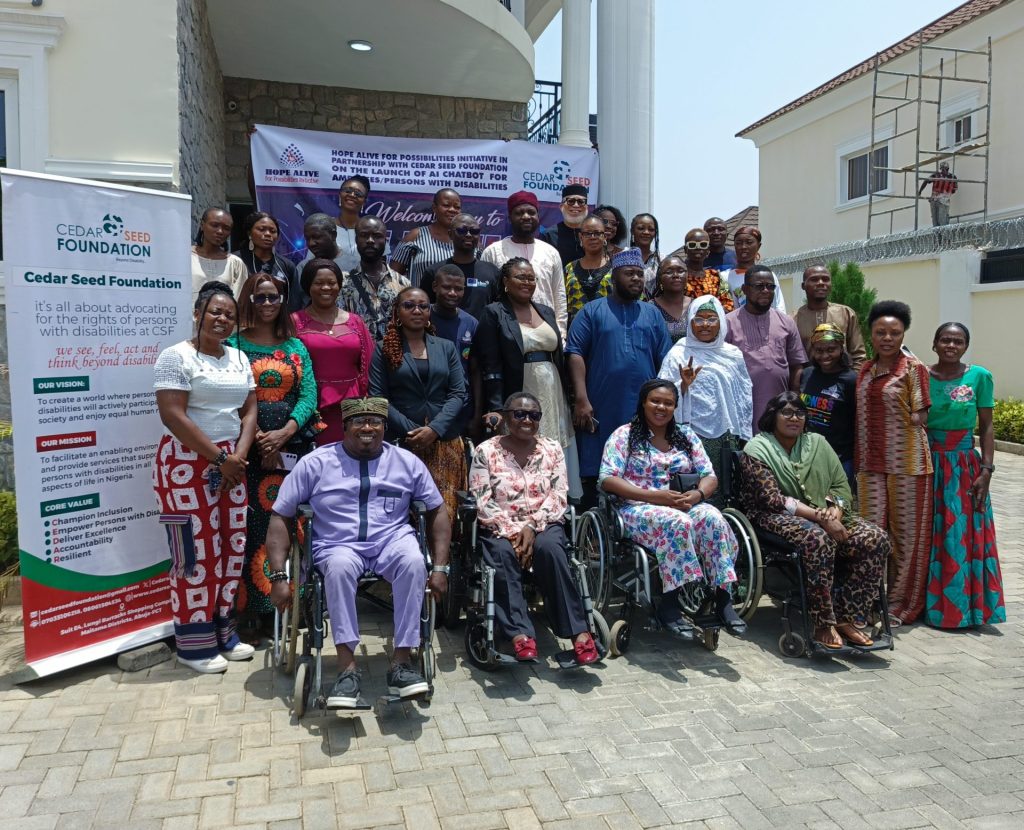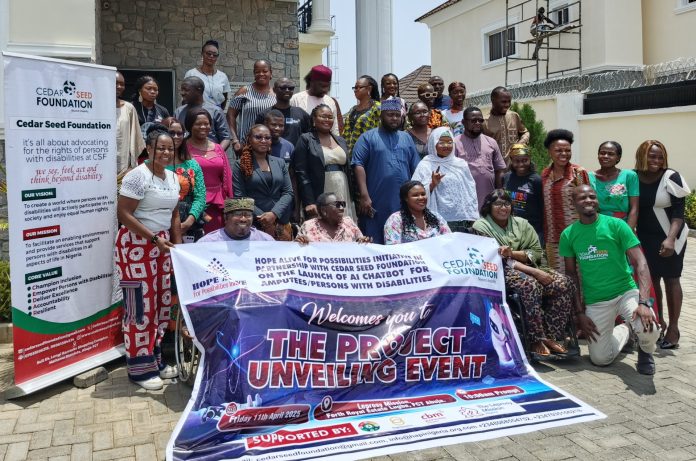Abuja, FCT – In a bold step toward bridging the mental health gap for amputees and persons with disabilities (PWDs), two leading disability-focused organizations—Hope Alive for Possibilities Initiative (HAPI) and Cedar Seed Foundation (CSF)—on Friday unveiled a groundbreaking project that fuses Artificial Intelligence (AI) with mental health support.
The event, held in Abuja, marked the official launch of the “AI Chatbot and Mental Health Support for Amputees and Persons with Disabilities Project,” a forward-thinking initiative designed to address the growing psychological needs of amputees and PWDs through a 24/7 AI-powered support system.
The launch attracted disability advocates, mental health professionals, government representatives, development partners, and the media, all unified by a shared goal—to harness innovation in tackling one of the most underserved areas of disability inclusion: mental health.
Responding to a Silent Epidemic
In her keynote remarks, Aver Akighir, Executive Director of HAPI, emphasized the urgent need for the project, citing an alarming 30% annual increase in the amputee population in Nigeria—largely due to bomb blasts, landmines, road accidents, and insurgent attacks.
“Many of these individuals live with deep psychological scars, but the systems in place to support their mental health are practically nonexistent,” she noted. “Our project responds directly to this crisis by offering compassionate, AI-driven mental health support that is available anytime, anywhere.”
Akighir acknowledged key supporters such as The Leprosy Mission Nigeria (TLMN), Sightsavers, and other partners who have helped bring the initiative to life. She shared that a research phase involving direct interaction with amputees would precede the development of the AI chatbot to ensure that it reflects their real-life experiences, anxieties, and trauma management needs.

Inside the AI Chatbot: Tech with a Human Touch
At the heart of the project is a state-of-the-art chatbot, designed using advanced Natural Language Processing (NLP). The chatbot will feature interactive storytelling, mood tracking, and gamified user experiences—all tailored to help amputees and other PWDs process their emotions, manage trauma, and build resilience.
According to Akighir, “This isn’t just about technology. It’s about healing, empowerment, and providing a sense of companionship to those who are often isolated.”
“Technology Is the Future – And We Must Be Part of It”
Lois Auta, Executive Director of Cedar Seed Foundation, reaffirmed the importance of inclusive innovation, stating: “Technology is the order of the day, and we refuse to let persons with disabilities be left behind. This AI chatbot isn’t just a project—it’s a movement to ensure that our voices, our pains, and our triumphs are heard and supported through the power of innovation.”
She called on government agencies, tech innovators, donor partners, and disability champions to support the project from the planning stage through to execution. “If technology can drive democracy and hold governments accountable, then surely, it can be used to support the most vulnerable among us,” she said.
Endorsements and Commitments
Representatives from Sightsavers, CBM Global, TLMN, ASLIN, the Federal Ministry of Health, and various disability clusters were present and vocal in their support.
Esther Bature of Sightsavers praised the initiative, noting, “This AI chatbot will be a listening ear when no one else is available. It will provide comfort and strength in solitude and empower PWDs to rise with confidence. We are proud to stand with this vision.”
Other speakers highlighted the importance of community-driven solutions that prioritize lived experiences, cultural context, and localized needs. Across the board, the sentiment was clear—this is not just another project. It is a lifeline.
A Call to Action
The unveiling of the AI chatbot project underscores a larger call to action: technology must be leveraged intentionally to serve humanity’s most marginalized communities. With Nigeria’s mental health infrastructure still evolving, especially for persons with disabilities, this initiative is timely and transformative.
As the project gains momentum, HAPI and CSF reaffirmed their commitment to ensuring that no amputee or PWD walks the journey of mental health alone.
“This is more than innovation—it’s inclusion, it’s healing, it’s hope.”


